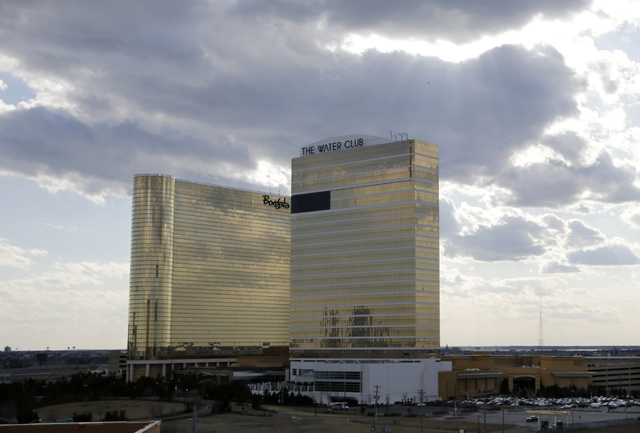MGM Resorts puts regulators’ nerves to rest

ATLANTIC CITY
New Jersey Division of Gaming Enforcement Director David Rebuck had one fear in restoring MGM Resorts International’s gaming license for its 50 percent interest in the Borgata.
He worried that the Las Vegas-based casino giant was going to take its $86 million from a trust account and flee the state.
MGM Resorts Chairman Jim Murren put those fears to rest after a nearly five-hour hearing in front of the Casino Control Commission on Sept. 10.
The company isn’t vacating Renaissance Pointe in the Marina District. In fact, a street between MGM Resorts’ vacant 72-acre parcel and Harrah’s Atlantic City, still bears the company’s old name, “MGM Mirage Blvd.”
Despite Atlantic City’s recent troubles — a 60 percent decline in gaming revenue since 2007 and closure of four casinos this year — Murren believes in the city by the sea.
“At $2.5 billion annually, Atlantic City is still a significant gaming market in the U.S.,” Murren said.
Rebuck oversaw the investigation of MGM Resorts, which parted ways with Atlantic City rather than sacrifice its investment in booming Macau four years ago after concerns were raised over the company’s business partner.
Boyd Gaming Corp., which owns half of Borgata, continued to operate Atlantic City’s market-leading resort. MGM’s stake went into a blind trust along with its share of profits from the hotel-casino while the company sought a buyer.
But 18 months ago, MGM Resorts decided it wanted the license back. The company began working to prove suitable to New Jersey.
“It was an unresolved issue in my mind,” Murren said. “As a company looking at new jurisdictions, we wanted to show that we had been vetted and approved everywhere.”
Rebuck called the MGM Resorts process a long, complex investigation.
“It was as thorough a review as anyone has ever done on this company,” he said.
New Jersey investigators went back to 2005 in looking at the MGM Resorts.
But Rebuck was up-front about his question: Would MGM Resorts just strike a deal with Boyd Gaming, take its money and run?
He had numerous discussions with Murren and other MGM Resorts executives, though the company’s answer wasn’t going to influence the state’s finding of suitability.
“I understand — that’s a business decision they have to make,” Rebuck said a day before the commission hearing. “I told them that I hoped they would stay engaged in Atlantic City, knowing that we are trying to do things on the cutting edge to make the industry healthier.”
Until that Wednesday afternoon hearing near the Boardwalk, executives from MGM Resorts and Boyd Gaming couldn’t discuss the Borgata.
“If I saw Jim coming toward me, I had to turn the other way,” Borgata President Tom Ballance joked.
Murren said the company will now have an active role with the property.
He said MGM’s entertainment connections — the company and arena/entertainment developer AEG are building a $350 million sports arena and events center behind New York-New York on the Strip — could lead to major attractions landing at Borgata.
“We think there is a lot to discuss from a programming perspective at the Borgata,” Murren said.
The company plans to work with Boyd Gaming to ensure Borgata continues to lead the market. In August, the property’s casino revenue increased 5.2 percent, to almost $65.9 million — 22 percent of Atlantic City’s total gaming revenue for the month.
MGM Resorts also will share in Borgata’s market-leading New Jersey Internet gaming business. Both MGM and Boyd have deals with European gaming giant Bwin.party.
That will be the extent of the company’s Atlantic City efforts in the near term.
The company owns 14 acres adjacent to Golden Nugget Atlantic City in addition to the vacant parcel between Borgata and Harrah’s. For now, both sites will sit untouched. In 2007, the former MGM Mirage announced plans to build the $5 billion MGM Grand Atlantic City adjacent to the Borgata but shelved the idea.
Boyd Gaming CEO Keith Smith said the company was happy MGM Resorts is again an active partner, though “the day-to-day operations at the property will be unchanged.”
In the end, MGM Resorts’ Macau partner, Hong Kong businesswoman Pansy Ho, was no longer a concern to New Jersey regulators. Her stake in MGM Macau was diluted over time, and she has zero say over the company’s Chinese operations.
MGM Resorts did pay some of a $225,000 fine for a corporate oversight failure.
Murren said it was a mistake to continue to consult with former company board member Terry Christensen after the Los Angeles attorney and legal confidant to 97-year-old billionaire Kirk Kerkorian — MGM’s founder and largest shareholder — was indicted and later convicted of wiretapping.
Rebuck defended New Jersey’s decision to investigate the Christensen matter.
“We dealt with the Christensen matter up-front,” Rebuck said. “We chose to do something that others did not do. You’ll have to talk with other (regulatory agencies) as to why they saw it differently than we did.”
Murren wanted to erase what he viewed as a blemish on the company’s record.
The New Jersey matter became a point of contention in recent years as MGM expanded around the United States. The company addressed the issue in both Springfield, Mass., and National Harbor, Md., where MGM Resorts was licensed for new resort complexes.
But with a potential and highly competitive Japan casino process looming — MGM Resorts is making a serious effort to win a license for a casino near Tokyo or Osaka that could bring in $5 billion in annual gaming revenue — Murren wanted to put issues in Atlantic City behind him.
“It was hanging over us,” Murren said. “We wanted to clear the air.”
Howard Stutz’s Inside Gaming column appears Wednesdays and Sundays. He can be reached at hstutz@reviewjournal.com or 702-477-3871. Follow @howardstutz on Twitter.